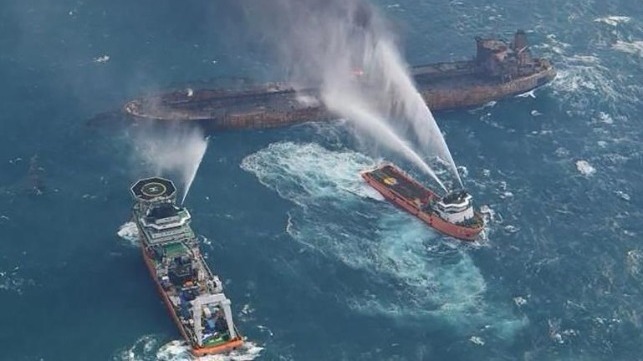In the wake of the sinking of the tanker Sanchi, researchers are attempting to estimate the impact of the release of her cargo into the marine environment. In addition to the loss of the vessel's 32 crewmembers, the final explosion and foundering led to what was likely the largest release of condensate in history.
Sanchi had about one million barrels of condensate on board when she collided with a bulker on January 6, and it is unclear how much of the cargo burned up or evaporated during the seven days she was on fire. If she still had most of her cargo when she went down, the spill may be larger than the amount of crude released by the Exxon Valdez in 1989.
Condensate is a volatile, toxic mixture of petroleum liquids that are extracted from "wet" natural gas. Its composition varies depending on where it was produced and how, but it typically contains some amount of benzene, a known carcinogen, along with other aromatic hydrocarbons. Since it has a high vapor pressure, some portion will evaporate, and the Shanghai Maritime Safety Administration asserted last week that any spill would likely dissipate within a day.
Not all are convinced that the effects will be so short-lived. Simon Boxall, a teaching fellow at University of Southampton, told Chemical & Engineering News that any cargo that went down with the Sanchi “will seep slowly into the ocean, providing a chronic pollution source for some considerable time, and will seriously damage the immediate environment." He warned that the material is much more soluble in water than crude oil, and will form a mixture rather than sitting on the surface. He called for a fishing ban in the region until the exact area of contamination is determined.

University of Southampton National Oceanography Centre via Phys.org
Researchers at the University of Southampton's National Oceanography Centre have attempted to forecast the extent of that pollution using advanced computer simulation. A team led by the center's Dr. Katya Popova found that it could take months for traces of the oil to reach the mainland, on the southeastern shore of South Korea. The forecast found that the probability of pollution reaching any shoreline was low, except for Jeju Island, which faces a moderate chance of experiencing the effects of the plume.
The marine life in the waters around the Sanchi's final position and in coastal areas off South Korea may be less fortunate. The forecast indicates a high chance that the spill could affect an area of the East China Sea of up to 200 nm long (measured north to south).
After Tanker's Sinking, Debate Over Response Begins

In the wake of the burning and sinking of the Iranian tanker Sanchi last week, tensions have arisen over the responsibility for the disaster and the adequacy of the response that followed.
The most provocative of the allegations relates to the cause of the accident. On Tuesday, Saudi-owned outlet Al Arabiya alleged that some Iranian lawmakers believe that American forces sank the tanker, and that Sanchi did not collide with the bulker CF Crystal as reported. Under this theory, the Sanchi was carrying a cargo of condensate to North Korea, not to South Korea, and American military assets sank her to prevent the delivery. No other major media entity or government body has made this claim.
The Iranian government immediately denied Al Arabiya's account and repudiated the theory that Sanchi was attacked. “The South Korean government has officially announced that the cargo of the sunken Sanchi belonged to them, and the Iranian mission inspected and photographed the ship," said Ali Rabiee, Iran's labor minister and spokesperson for the tanker incident. “If an American missile had hit the vessel, why didn't any radar detect it?” he asked.
South Korea's ambassador to Tehran, Kim Seung Ho, confirmed again on Monday that the Sanchi's cargo of South Pars condensate was bound for South Korea. Commodities traders have identified the purchaser as Seoul-based petchem firm Hanwha Total, and have reported the company's efforts to find replacement cargoes for the lost shipment aboard the Sanchi.
Dispute over China's response
While Iran's foreign ministry has credited China for its cooperation and its SAR response to the Sanchi disaster, some Iranian officials contend that Chinese agencies did less than they could to fight the fire because they believed the tanker's 32 crewmembers had already perished. Without a perceived chance of rescuing the crew, they imply, Chinese officials wanted the vessel's cargo to continue to burn off rather than spill.
"China could have sent more vessels to battle the fire . . . If operations were underway day and night, the fate of the crew could have been ascertained," said Mohsen Bahrami, a spokesperson of the National Iranian Tanker Company, speaking to media last week.
However, Iranian government spokesman Ali Rabiei said that China had done all that it could, and the Chinese Foreign Ministry defended its efforts. "In the case of such a complicated accident, it is not right to accuse China of holding back in its rescue efforts without going through necessary investigation," said spokesman Lu Kang in a regular briefing on Tuesday. "What is obvious at the moment is that China has offered the Iranian side all the necessary coordination to the best of its capability." He noted that China had contributed nine response vessels to the firefighting effot, and that 13 ships from all contributing nations were on scene from the second day onwards.
https://www.maritime-executive.com/article/diplomatic-acrimony-follows-tanker-s-sinking
Sad Sad Day
Thirty-two people died without a funeral and without coffins. They burned to ashes while their families could only wail.
Thirty-two people died without a funeral and without coffins. They burned to ashes while their families could only wail.
On Jan 6 2018, collision occured between the oil tanker Sanchi and the Chinese freighter CF Crystal, 257 kilometers (160 miles) off the coast of Shanghai. The cause of the collision remains unclear.
21 crew members of the CF Crystal had all been reported safe. But the oil tanker Sanchi, carrying nearly 1 million barrels of a gassy, ultra-light oil bound for South Korea, burst into flames.
The burning Iranian oil tanker exploded and sank on sunday Jan 14 after more than a week listing off the coast of China.
An Iranian official acknowledged that there was "no hope" of missing sailors surviving the disaster.
An Iranian official acknowledged that there was "no hope" of missing sailors surviving the disaster.
May they find peace and comfort at the bottom of ocean.
Our heart goes out to their family n friends..please remember that you are not alone...
Our heart goes out to their family n friends..please remember that you are not alone...



Comments
Post a Comment